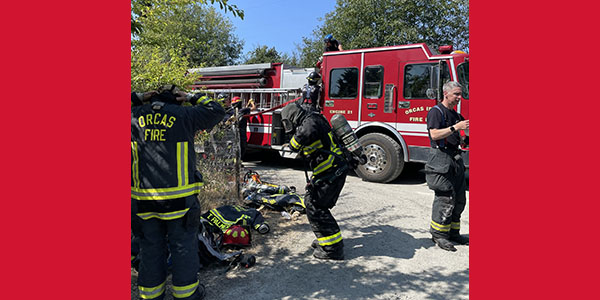
Gary Franco on Eastsound's Main Street Corner, now required to obtain permit by County ordinance
On Wednesday, September 16, Lopez Islander Gary Franco teamed up with the Institute for Justice’s Seattle office and filed suit against San Juan County for depriving him of his right “to make an honest living.”
In July 2009, the county passed an ordinance requiring vendors to obtain a permit to sell in public places.
Orcas Island Chamber of Commerce Executive Director Lance Evans spoke for the Chamber last summer, saying, “[It is] our belief that the public right-of-way should be reserved for pedestrian access. The Chamber supports private property owners allowing, or negotiating a right for a vendor to sell goods from that private property.”
Under the ordinance, a vendor must pay $50 for each day he wishes to sell after first receiving the written consent of competing business owners. Vending without a permit incurs a penalty of $250 per hour.
“In other words, government has given business owners the power to veto their competition,” states the Institute for Justice website.
At one of several public hearings prior to the ordinance’s appproval last July, Lance Evans said that the Chamber Board felt that “street vending should be … limited to private property,”
At the same meeting, Franco cited state law which prohibits restrictions on farmers selling their produce to the public.
Following input from several members of the public,Council member Howie Rosenfeld said at the Council Hearing on Orcas Island that street vendors were “a quaint tradition that is trying to be addressed through this ordinance… it might be a temporary way of preserving a town’s character, ” but the likelihood was that in the future the ordinance will be abused and restrictions will have to be tightened.
Council members Rich Peterson and Gene Knapp advised Franco to submit his comments in writing and the council unanimously directed Gaylord to amend the ordinance as suggested by the public comments.
Knapp later advised the Eastsound Planning Review Committee, whose members gave advice to the council on the ordinance, that it was likely street vending on public property will be prohibited outright should the ordinance fail to regulate street vending.
The ordinance was revised by County Prosecutor Randy Gaylord and approved on July 10, and went into effect July 24, 2009.
Franco’s suit against the County states the lawsuit is to “vindicate … Franco’s right to earn an honest living free from unreasonable goverment interference.”
The ordinance is “not only repugnant to economic opportunity, it is unconstitutional,” states the lawsuit, citing Article I Section 2 of the State Constitution which “protects everyone’s right to earn an honest living, especially in the face of the kind of economic protectionism in play here.”
San Juan County Prosecutor Gaylord said on Sept. 21, “We believe the ordinance is fully justified. We’re talking about county property that’s owned by all in the county, and reasonable use of county property.”
Franco’s suit appears to be “novel,” Gaylord said, “but we’re reserving making formal statements for now.”
Michael Bindas, a staff attorney at the Institute for Justice Washington Chapter said, “Hard-working entrepreneurs like Gary should not be threatened with thousands of dollars in fines simply because the government has given into favored businesses who want protection from competition; that is an abuse of government power.”
“Although the County maintains that requiring a permit to vend is necessary to ensure public health and safety, it doesn’t force all vendors to obtain a permit. Rather, it carved out exemptions for its own favored categories of vendors—for example, ice cream trucks; farmers who sell their own produce; and nonprofit and charitable groups, such as the Lions Club or Kiwanis. Vendors like Gary pose no more of a threat to public health and safety than these favored, exempt vendors, yet they are still required to pay the government and obtain the blessing of their competitors in order to earn a living.”
“Economic liberty is a basic civil right that cannot be trampled on simply to benefit special interest groups,” said IJ-WA Executive Director Bill Maurer.
Bindas added, “Entrepreneurs are the engine that will drive us into an economic recovery. The government needs to get out of their way and protect their rights rather than protect existing businesses from competition.”
“The Institute for Justice seeks not only to vindicate Gary’s right to economic liberty but also to challenge the premise of San Juan County’s licensing regime: that government can exclude someone from a lawful occupation simply to protect favored businesses from fair competition,” said Bindas. “A victory for Gary will establish important constitutional precedent protecting entrepreneurs throughout Washington.”
Persons exempt from the requirement to obtain a use permit would be newspaper carriers, peddlers and transient vendors who carry their goods door to door, charitable, fraternal or religious non-profits, farmers, gardeners and others who grow their own produce and persons authorized to sell items at the Eastsound Farmers Market.
All vendors, including those exempt from the use permit are required to:
1) assure that the vending space doesn’t reduce or obstruct pedestrian passage on the sidewalk
2) refrain from occupying parking spaces on county property reserved for vehicular traffic or parking;
3) refrain from soliciting or conducting business with people in motor vehicles;
4) refrain from leaving any portion of the vending unit unattended, or remaining on public property between midnight and 6 a.m.






